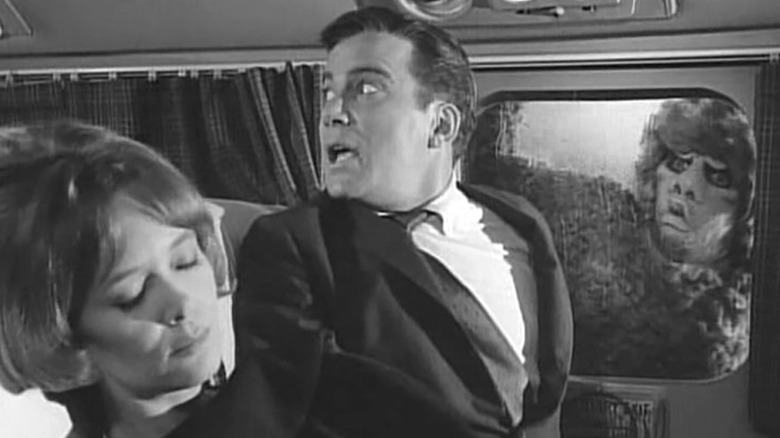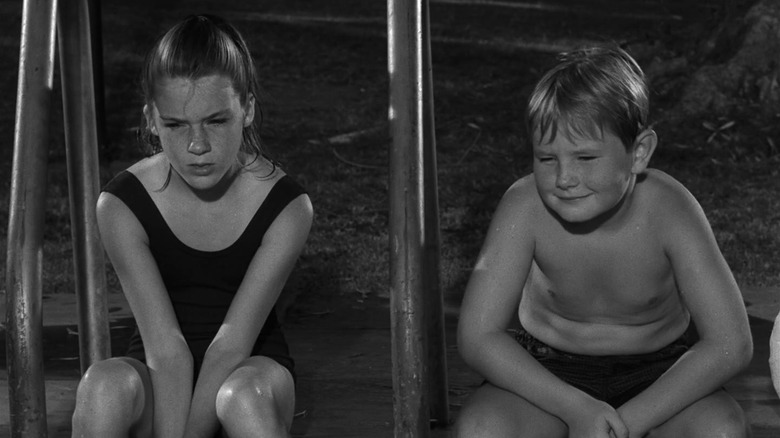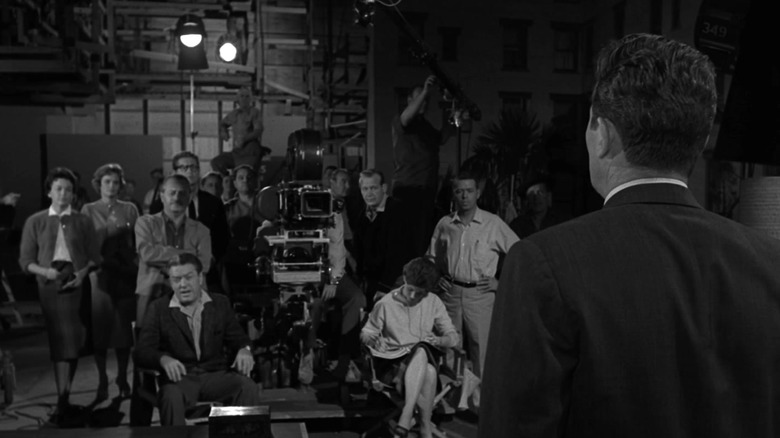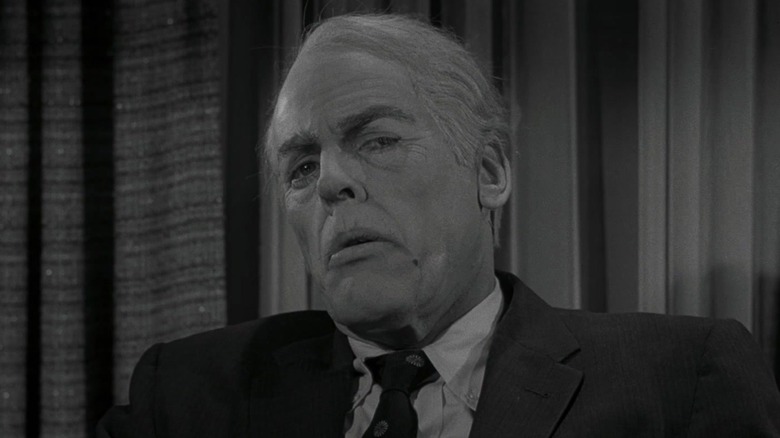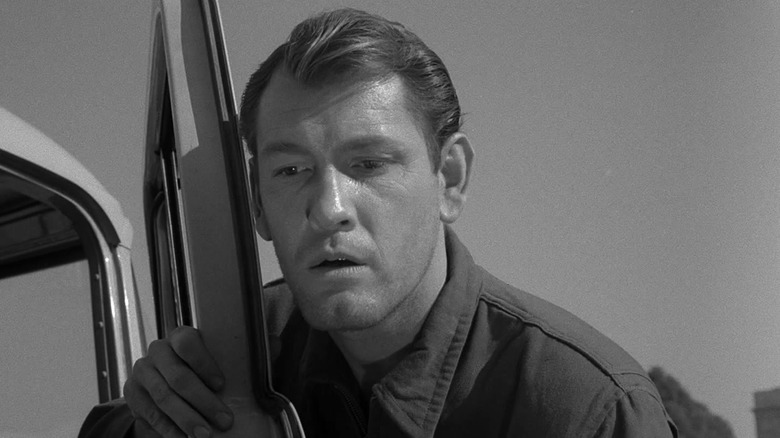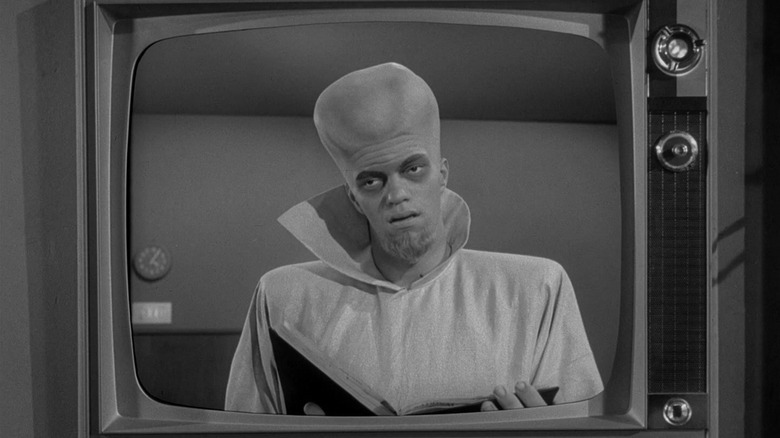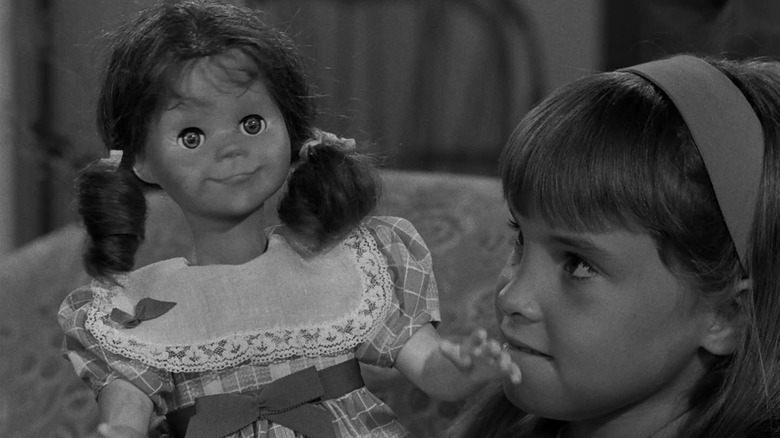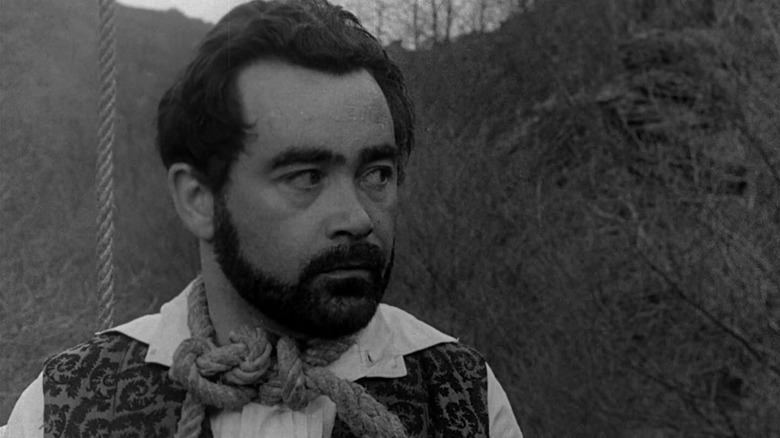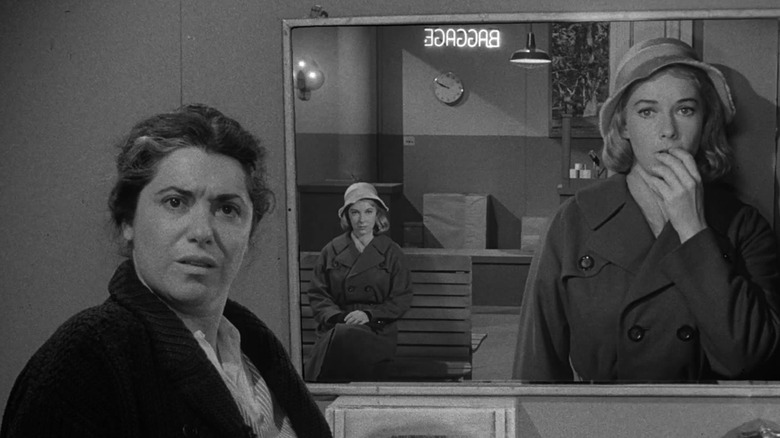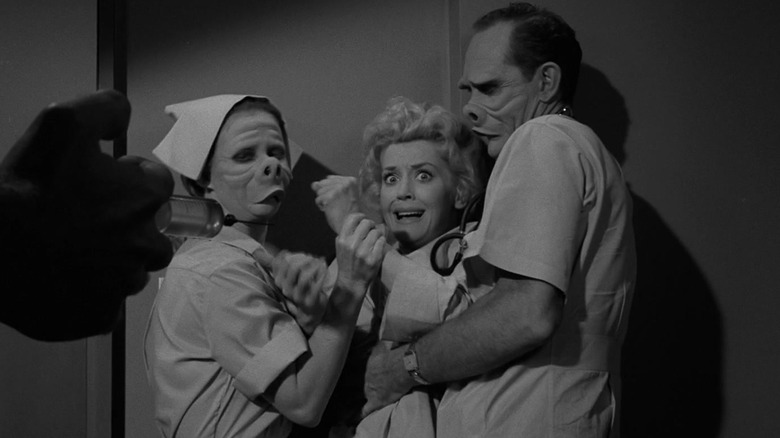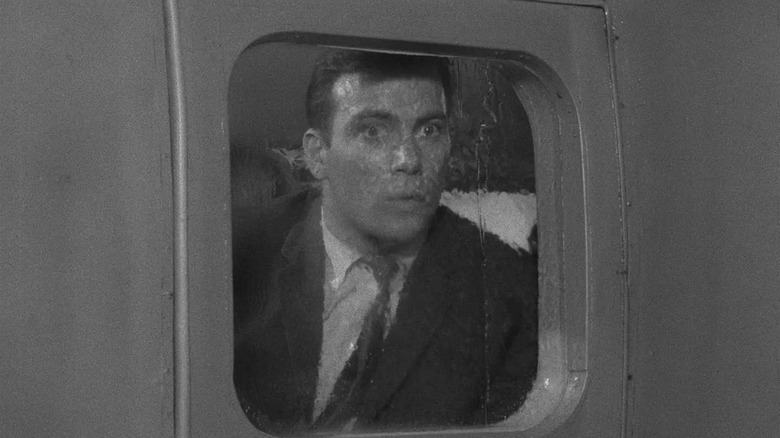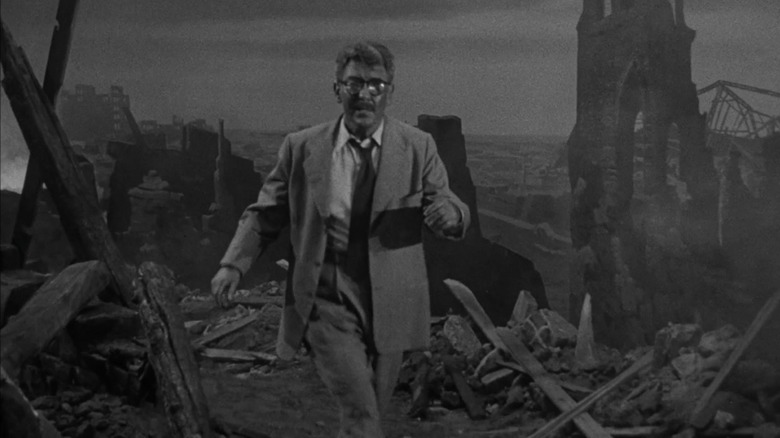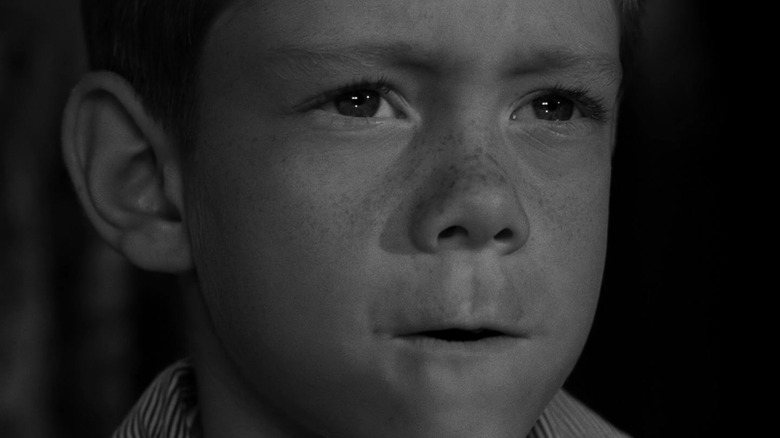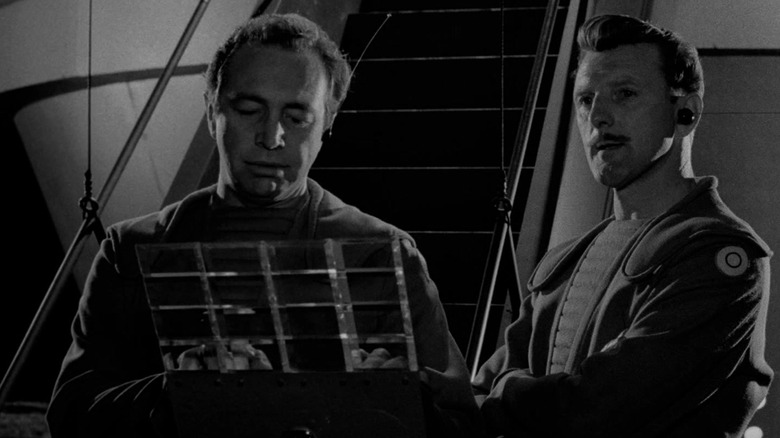The 15 Best Twilight Zone Episodes Of All Time, Ranked
"You're traveling through another dimension — a dimension not only of sight and sound, but of mind. A journey into a wondrous land whose boundaries are that of imagination." Thus began the narration by Rod Serling for his anthology show, "The Twilight Zone," which delivered an entirely new, surreal story every week for five seasons. Some episodes were strange nightmares, others more obvious political allegories, and others still primarily concerned with reversing audience sympathies and expectations. Endings were often ironic, and usually at least mildly surprising, while many of TV's best actors played lead roles on one or more episodes.
Like M. Night Shyamalan movies today, "Twilight Zone" episodes were known for big twists, and have been remembered for the same. They're more than just cheap shocks, however — the stories earn their endings, and usually have deeper themes that the surprises illuminate rather than obscure. Through the use of supernatural and sci-fi elements, Serling got away with thinly veiled social satire and critiques that would never have been allowed in a more straightforward way (though they weren't all winners). What he had to say resonates with us still, and has spawned several remakes and rip-offs, so much so that it's hard to pick the 15 greatest "Twilight Zone" episodes of all time. Nevertheless, we attempted it in the list below.
Warning: Many 60-year-old plot points and endings will be spoiled herein.
15. The Bewitchin' Pool (Season 5, Episode 36)
Though it isn't as quoted or remembered as some of the others on this list, "The Bewitchin' Pool" is most significant for being the final episode of the series, concluding a show that frequently used the power of imagination to frighten and provoke. Here, a magical swimming pool takes well-off but miserable kids Sport and Jeb (Mary Badham and Jeffrey Byron) to another reality, where they find themselves in a humble, overcrowded, but much more loving home run by the kindly Aunt T (Georgia Simmons).
Sport and Jeb decide to give their parents another chance, but when they find out they're divorcing, they dive back into the pool, disappearing forever from their cruel reality and into the fantasy. Lest anyone misunderstand, Serling's narration clarifies that the episode is not a metaphor for death, but the value of escapist fantasy for children. Extrapolate that to TV audiences of all ages, and it's a statement that nicely puts a bow on the whole thing.
14. A World of Difference (Season 1, Episode 23)
Businessman Arthur Curtis (Howard Duff) one day hears a director call "cut," and finds his entire life suddenly revealed as a non-functional movie set. Has reality shifted drastically, or is he in fact delusional actor Gerald Raigan, driven to mental illness by a brutal divorce and a heavy case of drinking? He still believes he is Curtis, but every bit of evidence he can find points to the contrary... at least initially.
The scenario is classic "Twilight Zone": Give the viewer a moment to identify with a protagonist, then suggest their world is not what it seems to be, and keep you guessing as to who's right. In the end, Curtis/Raigan disappears, seemingly into the movie, leaving behind a confused crew and family. In their own ways, could both realities have been real?
In our own post-"Spider-Verse"/MCU mediascape, that's an easy leap to make. In 1960, it was a mind-blower, priming the pump for future generations of multiverses.
13. The Night of the Meek (Season 2, Episode 11)
The alcoholic store Santa is a trope these days, usually as part of a cynical, anti-Christmas story. Yet in the "Twilight Zone" version, Henry Corwin (Art Carney) drinks not because he's a misanthrope, but because he cares too much and doesn't have the means to help more people. Encountering an enchanted bag that allows him to hand out the perfect gifts, Corwin wishes he could do the same every year. When his holiday wish is granted by the cosmos, he becomes the real Santa Claus.
Timed for Christmas 1960, this pointedly heart-warming episode is full of seasonal spirit, and it's a rare example of good karma paying off in "The Twilight Zone," as opposed to ironic punishments for personal sins. It's also one of only a handful of episodes to be shot on video to try to cut costs, an experiment that failed by making the shows look cheaper without saving enough money to make that worthwhile. Perhaps fate granted Serling's Christmas wish by returning the series to film shortly thereafter.
12. Long Live Walter Jameson (Season 1, Episode 24)
This episode suggests that Serling saw the promise of eternal life as somewhat less than enticing. Walter Jameson (Kevin McCarthy) has been cursed by an alchemist with natural immortality, though he can be killed by someone else. ("Escape Clause," a different episode, dealt with another sort of immortally touched man.) Tired of eternity and anxious to die, Jameson is nonetheless unable to bring himself to die by suicide. Instead, he spends his years loving and leaving, marrying young women and splitting when they grow old and he does not. Enraged, one of them finally kills him.
Serling's nihilistic closing narration suggests that only oblivion awaits after death, a controversial statement in 1960 and one that likely wouldn't make it to network TV today. Nonetheless, in a 1972 interview, Serling affirmed that he believed in God, though he was not an orthodox believer in any conventional sense.
11. Where Is Everybody? (Season 1, Episode 1)
The very first episode of "The Twilight Zone" set the tone for everything to follow with its surreal atmosphere, erosion of the familiar, and surprise ending, though there were no supernatural elements yet. The first subject offered for our consideration is Mike (Earl Holliman), a man with amnesia who finds himself alone on a dirt road. As he approaches a small town, he finds every place deserted, although at times he sees hints that people may have just left the scene, like a lit cigar or a jukebox playing music.
Unable to find another human soul and vaguely remembering he's in the Air Force, Mike starts to lose his mind from loneliness, until it's revealed that he's actually been having a hallucination while in a sensory deprivation tank. (Like many "Twilight Zone" twists, the sensory deprivation tank hallucination would become a trope, reused as recently as in "Stranger Things" and "Cobra Kai.") The ending is happy-ish, with Mike realizing this was merely practice for the loneliness that a trip to the moon would entail. Later episodes would feature far more brutal forms of isolation.
10. To Serve Man (Season 3, Episode 24)
The title of this one is probably Serling's greatest bit of wordplay. Nine-foot-tall aliens called Kanamits, all played by Richard Kiel (a.k.a. Jaws in the James Bond movies), come to Earth to bring about world peace, ending war and hunger, and leaving behind a book whose title is translated as "To Serve Man." Next come the invites to visit their home planet, described as even more of a paradise, which humans eagerly accept. Only too late do they realize that some words have the same double-meaning in Kanamit as they do in English, and "To Serve Man" is actually a cookbook. They only wanted us to be fat, happy, and unstressed in order to become tastier food.
Could Serling have been subtly protesting against the notion that free-range farms are humane? That's one possible reading. As often happens, more people over the years have focused on the details of the twist rather than the theme of the story.
9. Living Doll (Season 5, Episode 6)
"My name is Talky Tina, and I'm going to kill you!" Deadly dolls are a horror standby, but few are as terrifying as Talky Tina, who arguably begat Chucky, Annabelle (the movie version, at least), and Gabby Gabby of "Toy Story 4." Easily the most nightmare-inducing antagonist of the series, Talky Tina nonetheless has an ostensibly benevolent purpose: to protect her young owner Christie (Tracy Stratford) from her neglectful, unkind stepfather Erich (Telly Savalas).
Erich's no saint, but the way the creepy doll starts messing with him almost immediately engenders a certain amount of sympathy; what parental figure wouldn't try to destroy a toy that's seemingly possessed? Yet every time he ups the ante in trying to destroy Tina, she comes back with more threats that only Erich can hear, eventually causing him to fall down the stairs and die. That achieved, the episode concludes with Tina threatening Christie's mother. She'll be Christie's friend to the end, as another plastic playmate might say.
8. The Invaders (Season 2, Episode 15)
A woman (Agnes Moorehead) who lives alone in a small farmhouse with no electricity finds herself attacked by strange invaders from outer space. They're tiny figures in spacesuits who emerge from a flying saucer and attack with radiation guns and her knife. Eventually, she beats one to death and destroys the other in his spaceship, just as we learn from an audio transmission and markings on the UFO that the invaders are from Earth, and this is a planet of dangerous giants that they have found.
Moorehead never actually speaks a word, and is acting entirely alone or opposite special effects. The inevitable reversal is a great example of the way "The Twilight Zone" liked to create empathy for the "other." By removing labels until the end of the story, the episode has us realize that sometimes we aren't the underdog to root for, but the aggressor.
7. An Occurrence at Owl Creek Bridge (Season 5, Episode 22)
When is a "Twilight Zone" episode not a "Twilight Zone" episode? When it's actually an award-winning French short film, redubbed and repurposed because its twisty nature naturally fits in with the show's overall vibe. Nobody tried to hide it; in his introduction, Serling described it as a unique presentation and touted its Cannes Film Festival award. Though a French production, "An Occurrence at Owl Creek Bridge" originates as a quintessentially American tale, adapted from a short story by Civil War veteran Ambrose Bierce.
For a great many viewers, this was the first filmed entertainment to deliver the "he was dead the whole time" twist that delights each generation anew in movies ranging from "Carnival of Souls" to "Jacob's Ladder" and "The Sixth Sense." Just as Serling understood that good storytelling could upend people's prejudices by tapping into universal emotions, he also knew that the language of cinema could cross boundaries.
6. Mirror Image (Season 1, Episode 21)
Some episodes of "The Twilight Zone" make a larger point; "Mirror Image" makes this list because it's just plain creepy. A woman (Vera Miles) at a bus depot is told she has done things she doesn't remember doing, then catches a glimpse of an exact double of herself. She comes to realize it's an evil duplicate from another dimension that intends to replace her, but will anyone believe her in time?
Influencing any number of modern horror movies from Jordan Peele's "Us" to Damien Leone's original Art the Clown short "The 9th Circle," "Mirror Image" creates a terrifying atmosphere using a minimalist set and only very basic doubling effects. As with many others, it's the story perspective that matters; Millicent Barnes is effectively isolated by the fact that she's in a strange part of town, and nobody believes her until it's too late. Sometimes — often — the scariest thing in this world is when nobody has your back, and the bad thing is directly behind you.
5. Eye of the Beholder (Season 2, Episode 6)
This episode taught us all that what you don't see can be just as important as what you do. A woman named Janet Tyler submits to desperate plastic surgery to cure her ugly deformity, only to be revealed as typically actress-beautiful when her face bandages are removed. Except... she's in a world where everyone else looks like a pig person, and they declare the procedure has failed and she's doomed to be hideous forever, and forced to live in a quarantined area for people like her.
By not revealing anybody's face until the end, "The Twilight Zone" forced you to make up your mind about these characters with no idea how they actually appeared, thereby making the point that you can tell a lot about a person without seeing them — so why should their face be the prime factor in forming an opinion? One might argue the episode engaged in its own hypocrisy, with two different actresses playing Janet — one as her masked voice (Maxine Stuart) and the other her true face (Donna Douglas).
4. Nightmare at 20,000 Feet (Season 5, Episode 3)
A man who recently suffered a nervous breakdown and is terrified of flying sees a gremlin on the wing of his plane, but he can't persuade anyone else that it's there. Convinced by the circumstances that it's real nonetheless, he finally acts out in desperate fashion, while unseen evidence suggests he was right all along. "Nightmare at 20,000 Feet" lacks the socio-political morality of many other episodes, but it's an immortal installment for one major reason: the paranoid passenger, Bob Wilson, is played by William Shatner, who, as usual, relishes the chance to go big. (Sleep deprivation made his performance seem extra strung-out.) Indeed, when this same installment was re-adapted for "Twilight Zone: The Movie," the studio cast arguably the only actor on Earth who could go bigger: John Lithgow.
Lithgow and Shatner both riffed on the story in an episode of "Third Rock From the Sun," while many other shows and movies from "The Simpsons" to "The LEGO Batman Movie" have referenced it. Shatner himself has frequently been the subject of parodies of it.
3. Time Enough at Last (Season 1, Episode 8)
The fickle finger of fate, as Mad Magazine once called it, often strikes deserving victims in "The Twilight Zone," who get a comeuppance they deserve. "Time Enough at Last" stands out because it's especially brutal to a less deserving victim with its monkey's paw of a wish.
Poor Henry Bemis (future Batman foe Burgess Meredith) just wants time to be with all his beloved books so he can enjoy the simple pleasure of reading. Before you can say, "Settle down, Bemis!" a nuclear war kills off everyone else on Earth, and he figures he finally has it made. Alas, he breaks his Coke-bottle glasses, which are so comically over-magnifying that they make clear he has no chance of reading without them, even from the large-print section. Where he once had so many books but no time, he now has as much time as he likes, but no more ability to read. (Radiation will probably get him sooner rather than later, but the point has been made.)
Those of us with large movie or book collections that we never fully get time to sit down with should perhaps beware — and treasure our time with people, too.
2. It's a Good Life (Season 3, Episode 8)
So you think your kid is a demanding tyrant? Just imagine if he had godlike powers. "Lost in Space" actor Bill Mumy plays Anthony Fremont, a 6-year-old who has made the rest of the world outside his small town disappear completely, and demands that everyone remaining do all they can to keep him happy, or he'll psychically "send them into the cornfield," a place out of sight and out of mind. Nobody ever disciplines him, nor does he receive any karmic comeuppance. Some have read this episode as a metaphor for dictatorship, others as an exaggeration of what happens when children lack proper parenting. In adapting the story for "Twilight Zone: The Movie," director Joe Dante clearly couldn't bear to keep it a downer and had his Anthony realize the consequences of his actions.
The metaphor of sending those we dislike into the cornfield has become part of the cultural vernacular ever since.
1. The Monsters Are Due on Maple Street (Season 1, Episode 22)
Like "Invasion of the Body Snatchers," "The Monsters Are Due on Maple Street" is a story that can (sadly) be updated to any era, rooted as it is in fundamental human paranoia and distrust. A rumor of alien invasion, combined with several odd electrical occurrences, turns neighbors against one another, culminating in a big riot as they try to determine who the aliens are among them. In fact, the aliens have not even arrived yet; they're watching to see how easy we are to manipulate into aggression.
Whether a metaphor for the Red Scare, the War on Terror, or whatever it is you might call what's going on now, the real threat is always that those with all the power can easily manipulate those below them into fighting and demonizing one another, rather than unifying against the actual enemy. Instinctively, we know this, but when circumstances disrupt our daily routines, we so easily forget.
